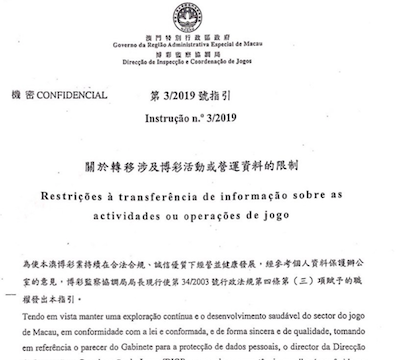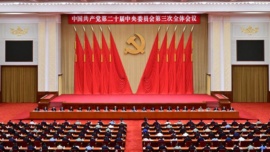Adds response from DICJ
The Gaming Inspection and Coordination Bureau (DICJ) is preparing to impose an instruction (Instrução nº3/2019) this coming Monday limiting gaming concessionaires and sub-concessionaires in Macau as well as other gaming operators known as junkets, any “transfer of information about gaming activities or operations, including customer personal data” for third parties, in the SAR or elsewhere.
The instruction, accessed by Macau News Agency (MNA), signed by DICJ Director Paulo Martins Chan and expected to come into force on 23 September, defines information on gambling activities or operations as “all data related to the individual and object of the gambling activities, or related to the operation of casinos and gambling activities, including but not limited to the personal data, place of origin or nationality, profession or the gambling clients’ activity and other information such as their representatives or accompanying persons, the time of entry into and out of the casino or the gaming table, the amount of bets, the credit, the amount of the bet placed, the payment of prizes and the purchase and redemption of chips (tickets), slot machines tickets (tokens), etc.”
The prohibition on the transfer of information goes further, “including and not limited to the company, the representative, the branch or the delegate of its associated entities or the same economic group.”
An exception to this rule is possible, says the DICJ instruction, but only when “the consent or power of attorney of the interested parties were obtained or are in compliance with the provisions of the Personal Data Protection Act.” However, “authorization from DICJ for each concrete transfer act” will be mandatory.
To obtain permission
The document, to which MNA had access, also defines the necessary explanations that gaming concessionaires and other operators must provide to DICJ in order to obtain the permission to disseminate the information. Namely the type of information, the entity that will receive it, if it to be sent outside the SAR, and for what purpose.
DICJ further reserves the right to request “any further clarifications or documents” as well as the power not to make “any occasional or generic authorization.”
All information is now considered “confidential” and game operators and junkets are required to “maintain confidentiality” as well as “take appropriate measures to prevent” its disclosure.
A duty of confidentiality that will remain “even if there has been a waiver or loss” of the respective gaming license.
Experts caught by surprise
Experts heard by MNA consider this statement “at the very least strange… It will have a strong impact, preventing information from being reported, for example, to regulators in other jurisdictions or to hotels owned by concessionaire and sub-concessionaire groups,” an analyst told Macau News Agency, predicting a “negative impact on stocks” of gaming operators in Macau.
On the other hand, he said, the Data Protection Act in force only requires authorization of the person concerned. With this instruction from the DICJ, the bureau “has powers to dispose against express law,” explains the same expert.
A Macau law expert, who also prefers to remain anonymous, told MNA this decision seems “unusual and clearly inappropriate and disproportionate.” And asks: “Why these restrictions? To what end? What happened before to justify these draconian measures?”
For this expert, “it seems clearly meaningless and senseless and violates legal norms that override instructions, namely commercial law norms, in particular, the unimaginable clause that prevents information for parent companies and others!”
Among the concerns is also the “form of instruction, that seems illegal for various reasons,” he says.
And lastly, “if the new competition for gambling concessions is coming, what is the framework: Unfair competition or to keep away certain foreign interests, namely Americans?”
DICJ denies violation of rules
In a written response to Macau News Agency, DICJ confirms the intention to impose its prior authorization but denies that any rules are being broken with the new norm.
“It is intended to ensure that the transfer of information about gambling activities by gambling concessionaires / sub-concessionaires and game promoters is in accordance with the SAR law, in particular with the legal regime governing the development of games of chance, the law on the prevention and suppression of money laundering crime and other legal acts, thus ensuring the healthy development of the same sector”‘ says the SAR’s regulator.
“The purpose of the instruction is not to completely prohibit the transfer of information by game concessionaires / sub-concessionaires and game promoters, but to subject it to the prior authorization of DICJ. These requests will be subject to consideration within the scope of their legal provisions and therefore there is no violation of the rules on the exercise of the respective rights”, explained DICJ to MNA.





















